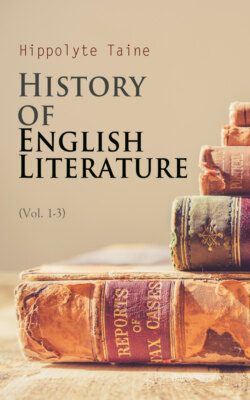Читать книгу History of English Literature (Vol. 1-3) - Taine Hippolyte - Страница 42
На сайте Литреса книга снята с продажи.
SECTION III.—Surrey's Style
ОглавлениеTable of Contents
An English Petrarch: no juster title could be given to Surrey, for it expresses his talent as well as his disposition. In fact, like Petrarch, the oldest of the humanists, and the earliest exact writer of the modern tongue, Surrey introduces a new style, the manly style, which marks a great change of the mind; for this new form of writing is the result of superior reflection, which, governing the primitive impulse, calculates and selects with an end in view. At last the intellect has grown capable of self-criticism, and actually criticises itself. It corrects its unconsidered works, infantine and incoherent, at once incomplete and superabundant; it strengthens and binds them together; it prunes and perfects them; it takes from them the master idea, to set it free and to show it clearly. This is what Surrey does, and his education had prepared him for it; for he had studied Vergil as well as Petrarch, and translated two books of the Æneid, almost verse for verse. In such company a man cannot but select his ideas and connect his phrases. After their example, Surrey gauges the means of striking the attention, assisting the intelligence, avoiding fatigue and weariness. He looks forward to the last line whilst writing the first. He keeps the strongest word for the last, and shows the symmetry of ideas by the symmetry of phrases. Sometimes he guides the intelligence by a continuous series of contrasts to the final image; a kind of sparkling casket, in which he means to deposit the idea which he carries, and to which he directs our attention from the first.[302] Sometimes he leads his reader to the close of a long flowery description, and then suddenly checks him with a sorrowful phrase.[303] He arranges his process, and knows how to produce effects; he uses even classical expressions, in which two substantives, each supported by its adjective, are balanced on either side of the verb.[304] He collects his phrases in harmonious periods, and does not neglect the delight of the ears any more than of the mind. By his inversions he adds force to his ideas, and weight to his argument. He selects elegant or noble terms, rejects idle words and redundant phrases. Every epithet contains an idea, every metaphor a sentiment. There is eloquence in the regular development of his thought; music in the sustained accent of his verse.
Such is the new-born art. Those who have ideas, now possess an instrument capable of expressing them. Like the Italian painters, who in fifty years had introduced or discovered all the technical tricks of the brush, English writers, in half a century, introduce or discover all the artifices of language, period, elevated style, heroic verse, soon the grand stanza, so effectually, that a little later the most perfect versifiers, Dryden, and Pope himself, says Dr. Nott, will add scarce anything to the rules, invented or applied, which were employed in the earliest efforts.[305] Even Surrey is too near to these authors, too constrained in his models, not sufficiently free; he has not yet felt the fiery blast of the age; we do not find in him a bold genius, an impassioned writer capable of wide expansion, but a courtier, a lover of elegance, who, penetrated by the beauties of two finished literatures, imitates Horace and the chosen masters of Italy, corrects and polishes little morsels, aims at speaking perfectly fine language. Amongst semi-barbarians he wears a full dress becomingly. Yet he does not wear it completely at his ease: he keeps his eyes too exclusively on his models, and does not venture on frank and free gestures. He is sometimes as a school-boy, makes too great use of "hot" and "cold," wounds and martyrdom. Although a lover, and a genuine one, he thinks too much that he must be so in Petrarch's manner, that his phrase must be balanced and his image kept up. I had almost said that, in his sonnets of disappointed love, he thinks less often of the strength of love than of the beauty of his writing. He has conceits, ill-chosen words; he uses trite expressions; he relates how Nature, having formed his lady, broke the mould, he assigns parts to Cupid and Venus; he employs the old machinery of the troubadours and the ancients, like a clever man who wishes to pass for a gallant. At first scarce any mind dares be quite itself: when a new art arises, the first artist listens not to his heart, but to his masters, and asks himself at every step whether he be setting foot on solid ground, or whether he is not stumbling.
